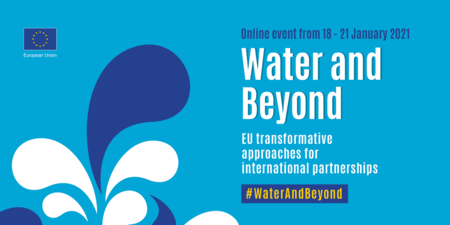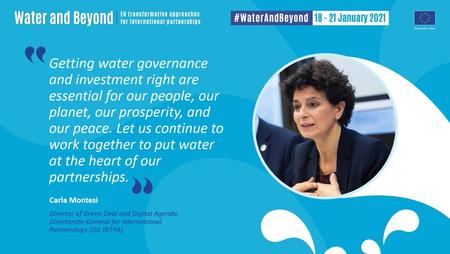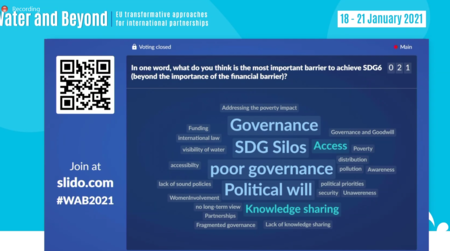Six promising opportunities highlighted at the EU Water and Beyond conference

After an intense and unprecedented four-day EU conference aiming to strengthen cooperation and partnerships on water towards reaching the Sustainable Development Goals and Paris Agreement, Sophie Aujean muses what’s next for European action on water, sanitation and hygiene (WASH).
In May 2019, the former Head of the European Commission (EC) water team shared with us the idea of organising an EU high-level conference on water. The plan then was to host the event six months later, just when the new EC would take office, so that water would be the first topic on which it would be asked to show leadership. Postponed several times, the Water and Beyond conference took place online on 18–21 January.
A timely conference for EU programming
It has been one year since Jutta Urpilainen, Commissioner for International Partnerships, began her mandate, but the conference was still very timely. It was the first event hosted by the new DG INTPA – EC Directorate General for International Partnerships, replacing the former DG DEVCO. This change of name from DEVCO to INTPA, and the new organigram, are supposed to reflect the EC’s "strong willingness to move away from a 'donor-recipient relationship' to 'partnerships of equals' with developing countries". It now remains to be seen how those partnerships will unfold.
The first test – and this is another reason why this conference was extremely timely – will be the EU programming exercise setting out EU aid priorities in terms of sectors and countries for 2021–27. This process is currently led by EU delegations, which are deciding on the three sectors they would like to focus on for the next seven years. It was promising that 70 representatives from EU delegations registered for the event, from 47 EU partner countries, including 11 where we operate (Bangladesh, Cambodia, Eswatini, Ghana, India, Mozambique, Nepal, Nigeria, Pacific, Papua New Guinea, Rwanda and Zambia).
A renewed momentum on water at EU Level
The fact that the event was opened at very high level by Janez Lenarčič, EU Commissioner for Crisis Management, and Stanislav Raščan, Ministry of Foreign Affairs of Slovenia, signals a renewed momentum on water at EU level. Both speakers made it clear that water should be at the top of the EU agenda because of its vital role in achieving the whole 2030 Agenda.
I was glad that the new Chief Executive of WaterAid Sweden also took part in the opening panel, together with the Minister of Water and Sanitation of Senegal, the Secretary of State for Foreign Affairs and Cooperation of Portugal (currently holding the EU Council Presidency), the EU Special Representative for Central Asia and the Vice President of SUEZ Group.
I am also very grateful to our water champions in the European Parliament, who delivered keynote speeches while Parliament was meeting in plenary. The French MEP Chrysoula Zacharopoulou, a gynaecologist, reminded the audience that water is vital to build our resilience to future pandemics and as a tool for human development. The Swedish MEP Pär Holmgren, a meteorologist, opened the session on climate and water, focusing on the needs of climate-vulnerable people to access to WASH.
The cross-cutting nature of water
The conference explored the cross-cutting nature of water through seven sessions, including four that we co-organised. The first focused on human development, featuring speakers from UNICEF, the World Health Organization (WHO), the EU Delegation to Burkina Faso, WaterAid Nepal, and the Cambodian and Moldovan Governments. They highlighted that WASH is vital throughout the life course, to address inequalities and make the most of education, nutrition and health programmes.
Director of the Public Health, Environment and Social Determinants of Health Department of WHO Maria Neira’s message to the EU was crystal clear:
You know the argument: access to WASH is about human development, there's no more cost-effective intervention. It’s now just a question for you to be pragmatic, and you will see enormous benefits in all areas.
On day two we co-organised two sessions with UNECE, on finance and on climate.
It was wonderful to hear Sanitation and Water for All CEO Catarina de Albuquerque’s passionate call:
If there's anything we've learned from 2020, it is that business as usual is not an option. Transformation is the only way forward – and water, sanitation and hygiene are at the heart of how we transform.
Representatives from the French Development Agency, Veolia, the World Bank, the EU Delegation to Lesotho and CSOs looked at the financial landscape for Sustainable Development Goal 6 and options to bridge the financial gap – even more urgent in view of the COVID-19 and climate crises.
I am glad that Henk Ovink, Special Envoy for International Water Affairs of the Netherlands, opened the session on climate, given his Government hosted the Climate Adaptation Summit just a few days later. This session also featured WaterAid Bangladesh and the European Commission DG Climate.
Pedro Arrojo-Agudo, the new Special Rapporteur on the human rights to water and sanitation, opened the last session, focusing on governance. He called on the EU to strengthen the financial capacities of local authorities in charge of WASH, which is a foundation for public health. A useful conversation with the European External Action Service, Aquafed, WaterAid Ethiopia and Women for Water Partnership followed, on our respective roles to address the weak governance of the sector and enforce the human rights to water and sanitation.
What’s next now to ensure the EU acts on WASH?
There are several promising opportunities ahead of us:
- First, the EU should take the opportunity of the EU programming exercise to not only increase its WASH allocations within its overall Overseas Development Assistance (ODA), but also ensure its WASH ODA is targeted to least-developed countries and channelled via budget support or grants rather than projects and loans.
- Second, it has been emphasised many times, including during the closing of the conference, that water is expressly mentioned as a priority of the EU external action under the 'green deal' objective. In addition, an announcement was made on the recent EU support (€19.7 million) to Climate Investor Two, a blended facility funding 'commercially viable' water and sanitation projects. And we heard that the EU would soon launch a climate adaptation strategy, which would also look at water. These are all positive signals. However, ultimately we need to see EU investments in WASH that target the communities most vulnerable to climate change as part of an essential strategy for climate adaptation.
- Third, the Slovenian Government announced it would lead on Council conclusions on water, to be adopted by the end of 2021. It is critical that those conclusions acknowledge that WASH is central to EU efforts to ensure the socio-economic recovery is healthy, green and just.
- The fourth opportunity was somehow overlooked (despite many high-level speakers being based in Sub-Saharan Africa) – the partnership between the EU and Africa. It is in their common interest to decisively put human development at the heart of their future partnership. Indeed, none of the five key objectives the EU put forward (such as the green transition, sustainable growth or peace and governance) for its partnership with Africa can be achieved without universal and equitable access to basic public social services – including WASH.
- Fifth, many speakers during the event framed WASH as a key public health intervention. And indeed, we call on the EU to significantly increase its funding to WASH in healthcare facilities. Moreover, we urge the EU to show leadership by championing the UNICEF–WHO Hand Hygiene For All initiative and by adopting an EU Global Health Strategy, to achieve its global health aims and ensure preparedness for global health crises.
- Last, during the session on governance and the closing, we discussed extensively the role the EU could play in enforcing the human rights to water and sanitation. It was great to see the EU adopting its guidelines on these rights in June 2019, and encouraging to hear how it is monitoring their implementation. At WaterAid, through the Making Rights Real approach and several other tools, we stand ready to work together with EU delegations to ensure those rights become reality.
I am very grateful for the tenacity of the water team in the EC and co-organising partners (UNECE, UNESCO, Borda and Women for Water Partnerships) who made the event happen.
Sophie Aujean is WaterAid's EU Representative. Follow our EU advocacy on Twitter at @EUWaterAid, and follow Sophie at @SophieAujean.






